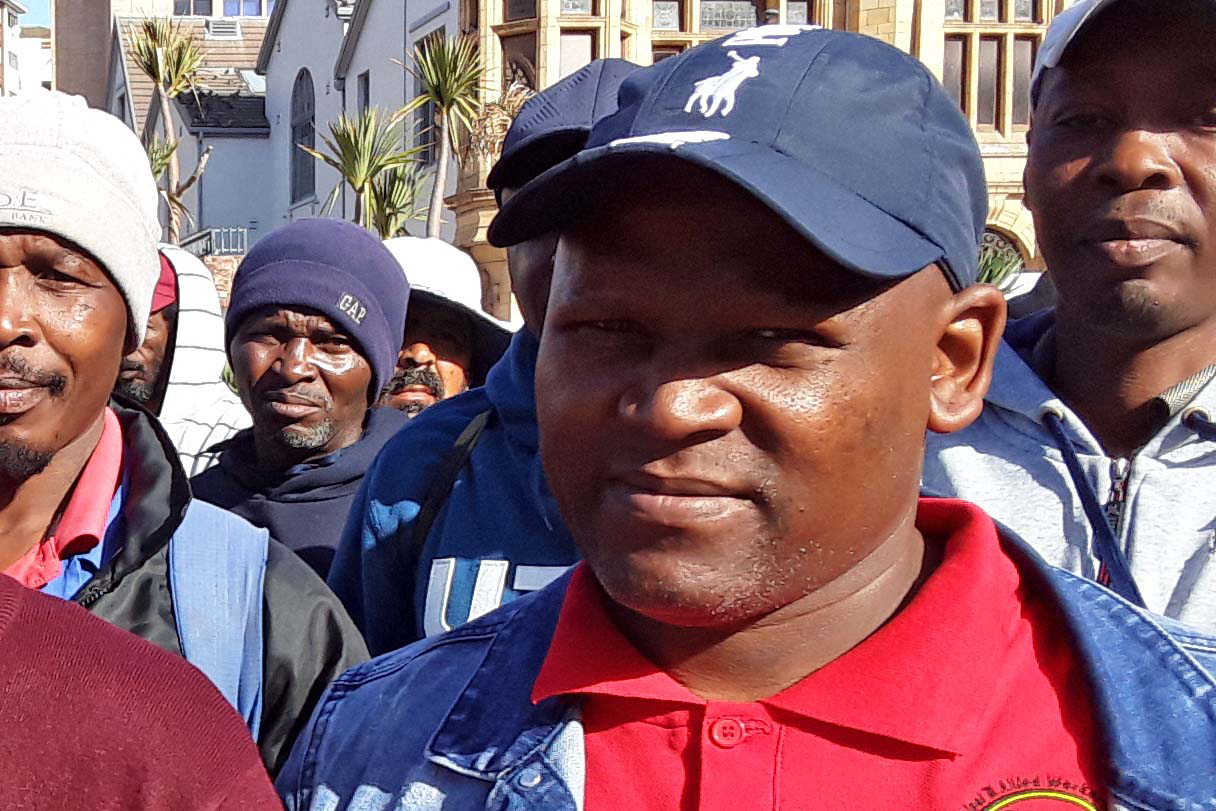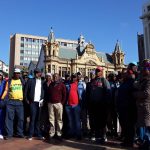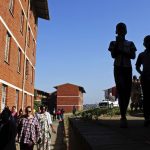Workers’ union mourns Bongani Cola
The Nelson Mandela Bay branch of Demawusa is trying to come to terms with the loss of their chairperson, shot and killed outside his home. Was it a political killing?
Author:
12 July 2019

Bongani Cola, a plumber, water inspector and the regional chairperson of the socialist Democratic Municipal and Allied Workers Union of South Africa (Demawusa), was “the sharpest activist” who would work through the night organising municipal workers, paying costs from his own pocket and selflessly lending his car to anyone who needed it for union work, according to his grieving comrades.
Cola was killed on 4 July in an alleged assassination in New Brighton, Nelson Mandela Bay. He was shot in the shoulder while walking the few steps from his home to his car, early in the morning. As he fell to the ground, he was shot again in the stomach and died almost instantly.
The shooter or shooters left without taking Cola’s car or any of his belongings. The police are clearly investigating the murder as a hit, as they have told Demawusa that they are going through Cola’s phone records to see if they can find any evidence of him receiving threatening phone calls or voice messages.
Related article:
The stress of losing a beloved friend and comrade was etched on the faces of Demawusa provincial coordinator Siphiwo Ndunyana and Jabu Sobza, a regional coordinator for the union. Between making plans for a memorial service in the Nelson Mandela Bay city hall next week and helping with funeral arrangements for the weekend after that, they reminisced about the years they spent with Cola.
Ndunyana remembered the day in 2010 that he first met Cola. The latter had just joined the Nelson Mandela Bay municipality when a strike began. “He joined the strike within his first few days at work and was a natural leader. We are all feeling devastated at his assassination and we will always remember him,” said Ndunyana.
“He was so devoted to his work, both to his professional and his trade union work. The role he played was indelible. For him, getting up whenever there was a clarion call was second nature. Our loss is really heartfelt,” said Sobza.
Insourcing battle
At the time of his death, Cola worked in the infrastructure and engineering department of the Nelson Mandela Bay municipality and was leading a years-long struggle to have plumbers, meter readers, electricity workers, lifeguards, cleaners and service delivery call-centre workers insourced. This struggle paid off when the call-centre workers were finally insourced this year after working as contractors for 11 years.
Cola saw the high levels of outsourcing in Nelson Mandela Bay municipality as a key enabler of corruption, with multiple privately owned companies involved in tendering for services that could be provided at a better quality and lower cost by full-time, permanent municipal workers.
Ndunyana said Cola had also agitated against a circular issued earlier this year by the South African Local Government Bargaining Council, which effectively barred municipalities from concluding recognition agreements with any union other than the Independent Municipal and Allied Trade Union (Imatu), a Federation of Unions of South Africa affiliate, and the South African Municipal Workers’ Union (Samwu), a Congress of South African Trade Unions affiliate whose former leaders are facing criminal charges after allegedly robbing the union of R170 million.
The circular was endorsed by Samwu, Imatu and the employer organisation, the South African Local Government Association (Salga). It contradicted global, historical labour tradition that competing unions need to out-organise each other fairly, instead of bringing in the bosses to crush their opponents.
Because of this circular, security guards were removing Demawusa organisers from municipal work sites when they tried to meet with their members. New Frame reported last month that this circular also flew in the face of a 2018 Constitutional Court judgment, which ruled that minority unions have the right to organise and bargain.
Related article:
“Bongani could not understand why, even after the Constitutional Court ruling, that a democratic state would still refuse workers what they fought for over many years, the right to form unions. Workers cannot be represented by unions they have not chosen, this is a misrepresentation,” said Ndunyana.
Threat ‘exposed’
Demawusa’s sister socialist union in the municipal sector, the Municipal and Allied Trade Union of South Africa (Matusa), which is based in the Western Cape and Northern Cape, agreed.
“The senseless killing of comrade Cola exposes the threat that alternative unions are to corrupt sweetheart unions (Samwu and Imatu). Matusa lays the blame squarely at the doors of Salga, the SALGBC [the South African Local Government Bargaining Council], Samwu and Imatu as they are hell-bent in keeping both Matusa and Demawusa out of the local government sector,” said Matusa general secretary Kurt Ziervogel.
Cola was also an active member of the Economic Freedom Fighters and had received support from the party for the insourcing campaign of the municipal call centre workers. EFF Nelson Mandela Bay councillor Lukhanyo Mrara, deputy chairperson of the EFF Nelson Mandela region, said Cola’s murder was “devastating news”.
“We call upon the crime intelligence unit to do all in their power to bring the perpetrators to book. We have noticed with concern a number of shootings in our region. We are losing a lot of intellectuals like Bongani Cola,” said Mrara, adding that there was a lack of police intelligence in assassination cases.
Related article:
Ndunyana said he was hopeful that the police investigation would shed some light on who killed Cola. In the meantime, Demawusa has decided to “take his spear forward until workers are free from super-exploitation. We are going to do that in his honour,” he added.
Ziervogel said that in the wake of Cola’s alleged assassination, Matusa would “close ranks” with Demawusa and speed up talks to merge the two unions. “We need to honour the memory of Comrade Cola by joining forces in building a viable alternative for all municipal workers and beyond,” he said.
Independent labour analyst and former Samwu collective bargaining officer Dale Forbes said, “The assassination of labour leaders in the context of a highly contested workplace is of grave concern.”
Minimal response
Forbes referred to a 2017 book written by former government employee Crispian Olver on corruption in Nelson Mandela Bay municipality, How to Steal a City, in which Olver found that a local ANC faction working with a criminal syndicate was involved in widespread corruption in the city.
“This spreads suspicion on who the possible perpetrators could be. We need to be vigilant of strong-arm tactics being used to suppress the voice of the workers,” said Forbes.
On the other side of the table, Imatu, Salga and the SALGBC refused to answer any questions related to Cola’s assassination, and would not say if they believed the contested bargaining council circular had contributed to a climate in which leaders of Demawusa were being targeted.
Mthubanzi Mniki, the spokesperson for Nelson Mandela Bay mayor Mongameli Bobani of the United Democratic Movement, would only say that Bobani was sad to hear that an employee of the municipality had been killed.
He referred the matter to mayoral committee member for corporate services, ANC councillor Makhi Feni, who said no extra protection would be offered to Demawusa members at Nelson Mandela Bay municipality as “the safety of all employees is of the utmost importance”.
Feni said the council condemned violence and it was not certain that Cola’s death was a political assassination as police were still investigating his killing.



